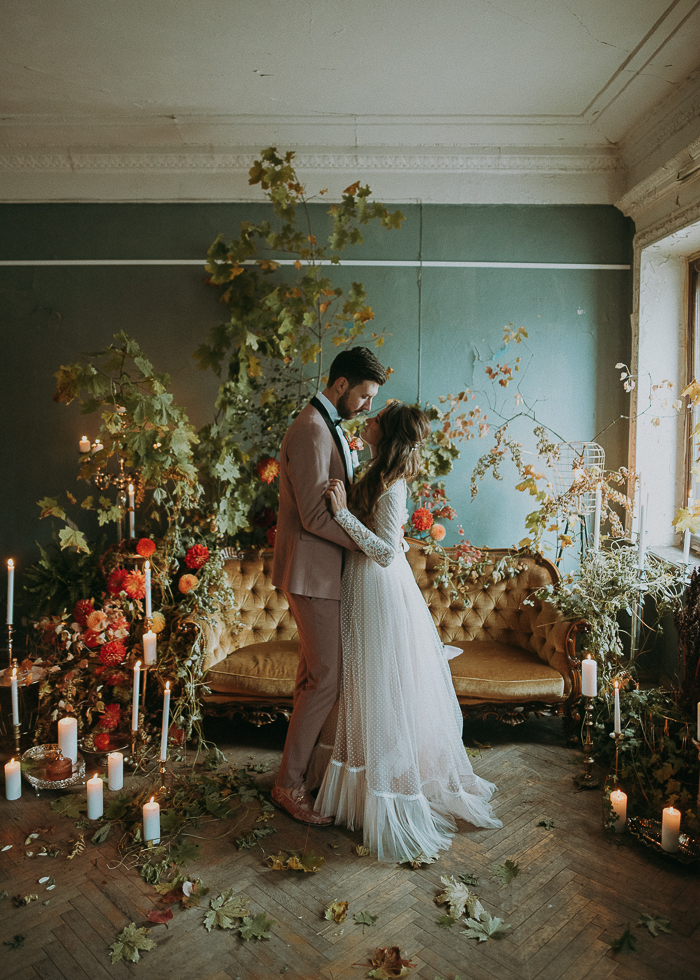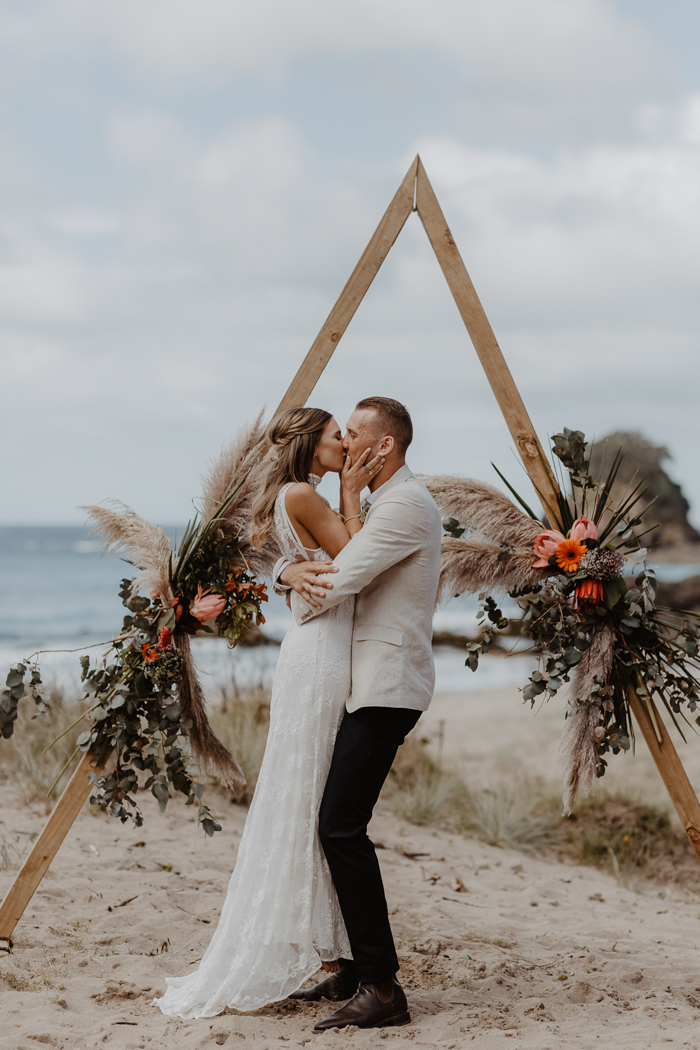
Image by Anni Graham Photography
We know money is a sensitive subject. But, when it comes time to set your wedding budget we want you to feel confident, so you can walk away from your budget spreadsheet knowing that you nailed it. That’s why we put so much time into creating wedding budget advice, tips, tricks, and tools for every couple.
We hear frequently that couples aren’t sure how to get started creating a wedding budget. That’s what we’re answering today. Every couple is different. So every budget will be different. However, there are some fool-proof steps you can take to create the best wedding budget. Let’s get started creating a wedding budget that is perfect for you and your significant other.

Image by Miks Sels Photography
Set Your Wedding Budget Priorities
Before you do anything budget-related, you and your partner have to decide your top priorities for your wedding day. Chances are you won’t be able to throw unlimited amounts of money at everything you both want, so it’s important to decide together what areas will get the most attention. We recommend you each make a list of priorities separately, from highest to lowest, and then share them with one another.
From there, choose the top three areas you both think are most important, and plan to spend a good chunk of your budget on those areas. If you realize that none of your top three priorities match, try and switch to a top-two or top-four list, where each of you gets to choose one or two must-haves.
Then list out the other areas below those top priorities—from highest to lowest again—so you know how to allocate the remaining budget.

Image by Nikk Nguyen Photo
Talk to Anyone Who Is Contributing
Before you and your partner set your final numbers, talk to anyone who has expressed interest in helping fund your wedding and figure out exactly how much they want to contribute. That way, you can either subtract that number from you and your partner’s contribution–meaning you’ll pay less than you initially thought–or you can allocate the money you’re saving into another area of the wedding.
If your parents or grandparents haven’t brought up money by the time you’re ready to start creating your budget, don’t be afraid to ask in a polite and respectful way. If you approach the subject out of curiosity rather than with the expectation that they pitch in, they will be more likely to understand where you are coming from. Be prepared for the possibility that they might not be able to contribute anything.

Image by Maggie Grace Photography
Crunch The Numbers
Now that you know your priorities and know who is contributing money to the wedding, it’s time to figure out exactly how much you and your partner are willing to spend. This number will vary for every couple, but it should always be realistic. Meaning it needs to fit your personal finances and long-term goals, not the other way around.
Determine how much you can comfortably pull from your everyday budget without taking away from your other expenses. Then look ahead and figure out how much you can realistically put into a wedding savings account. Lastly, determine if you can responsibly take money from other savings accounts and how much that could be.
Keep in mind that ideally you and your partner should have about three months of living wages set aside in case of emergencies and you shouldn’t negotiate that security for the sake of your wedding. You also want to make sure you’re still making payments on existing debts, such as credit cards or student loans. Be sure to take these things into consideration as you crunch the numbers.
Once you have your numbers, combine them with any contributions you’ll be getting from family members, and you’ve got a budget to start working with.

Image by MemoryBox Photography
Determine Your Guest Count
Unless you’ve decided to elope, the greatest impact on your budget is your guest count. It will determine your venue size and your food and alcohol budget since you’ll likely pay per person. If you’re on a really tight budget, this is where it’s most important to be strategic and follow narrow down your wedding guest list to ensure you can afford your other must-haves.
Even if you’re not on a tight budget, take some time to think about what size wedding you really want. Then think about the financials in terms of how much you and your partner want to allocate to catering and how that breaks down per-person. From there, you should be able to budget out multiple scenarios with varying guest counts and choose the one you like the most.

Image by Nikk Nguyen Photo
Research, Research, Research
Couples tend to forget when setting a wedding budget that location determines many of the expenses. Weddings vary in cost depending on geographic location, which is why researching the costs in your specific area–or your specific destination–is vital for keeping you and your partner on budget.
While researching, also note the price differences for getting married during the week versus the weekend and the price differences for each month of the year. There are many creative ways to save money on your wedding, so do as much research on your options as you can.

Image by Isaiah and Taylor Photography
Prepare For The Unexpected
When it comes to wedding planning, unexpected things will come up. It a fact and it’s totally okay. Some things you’ll be able to rework, and others you’ll have to let go of. One way to stay ahead of the game is to prepare for wedding expenses that aren’t on most wedding budget lists.
For example, did you know that some hotels will charge you as much as $7 per unit to deliver welcome bags to your guests’ hotel rooms? Yeah, that one catches many couples by surprise, too. These little things add up over time, which is why we’ve created a list of unexpected wedding expenses to keep in mind. It covers everything from postage to taxes, tips, and fees. Trust us, you’ll be so glad you built those little things into your budget from the very beginning.

Image by Wild & Grace
Decide Whether The Honeymoon Is A Separate Wedding Budget
Now, for the best part of wedding planning–the honeymoon. Some couples include the honeymoon and its essentials in their overall wedding budget, while others choose to create a separate budget altogether. Again, everyone is different here. It will depend on what seems most logical to you and your partner.
You may have money in your daily budget set aside for travel, and the honeymoon would come out of that, so it makes sense to keep them separated. Or, perhaps it’s easier to set one budget and include everything wedding and honeymoon related into that. There’s no one right way to do it. Just be realistic and decide what works for your unique situation.
With these tips, you should be well on your way to creating the best wedding budget for you and your partner. We know that wedding planning–budgeting especially–can be stressful, so be sure to check out our ten tips to beat wedding planning stress before you tackle any stressful tasks.

Image by May Iosotaluno















.jpg)




Excellent read Juliette. With so many aspects to consider, especially the unexpected ones, creating a budget is truly among the most difficult tasks while planning a wedding. You want your special day to be as memorable as possible for yourself and your partner, but also don’t want to spend all of your savings on it.
I found this very interesting. thanks for sharing.
Excellent article. Very interesting.
MUCHAS GRACIAS POR TUS TIPS
Best Wedding Budget blog
Such a great article! I wish I could share this with my clients.
Hi there, you can definitely share this with your clients!